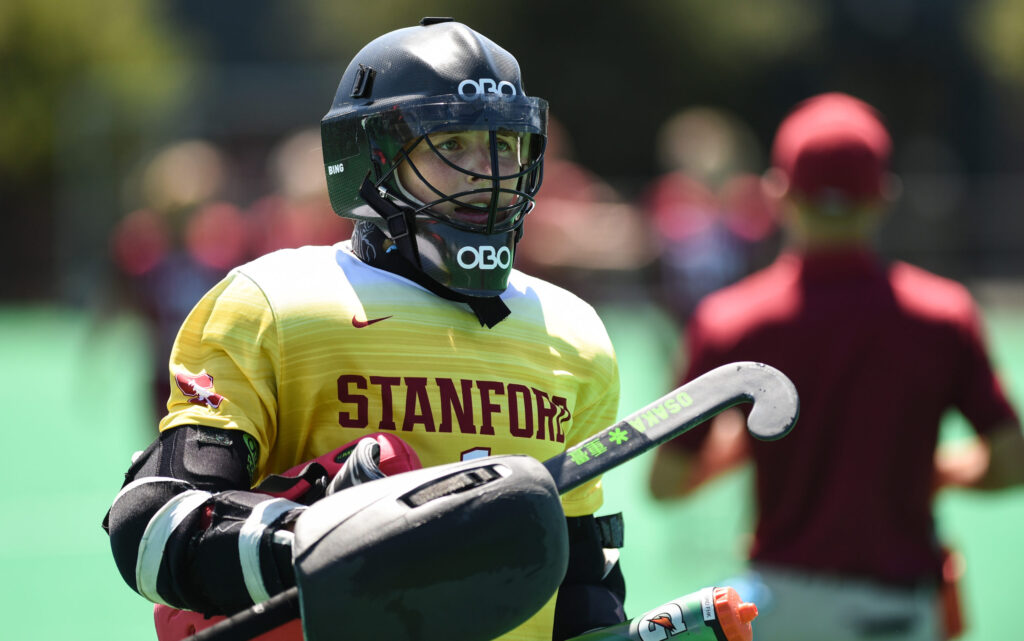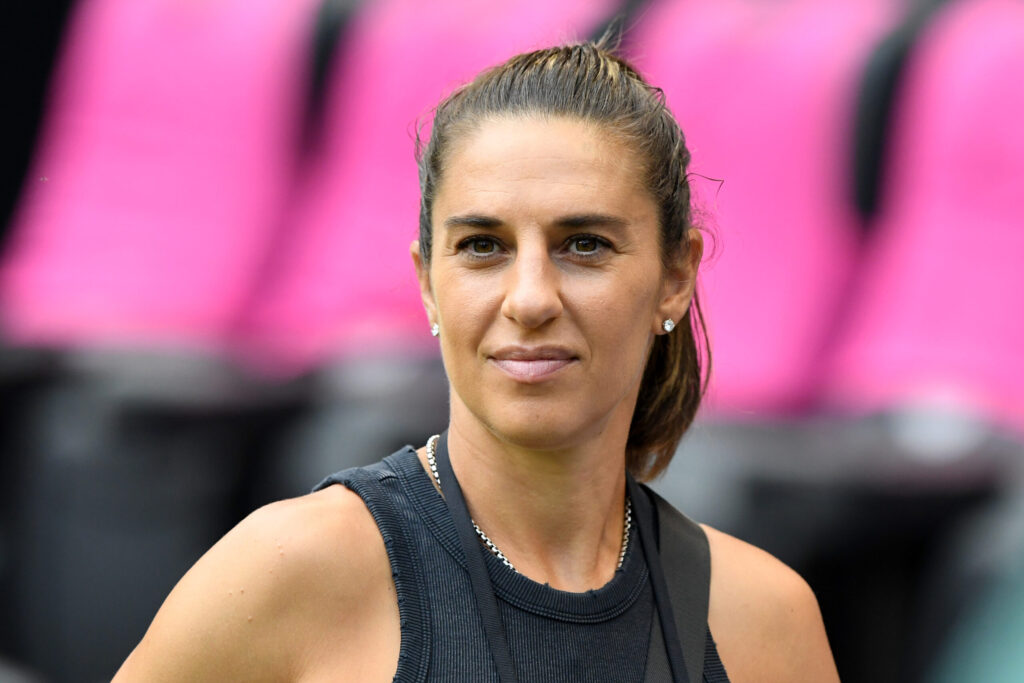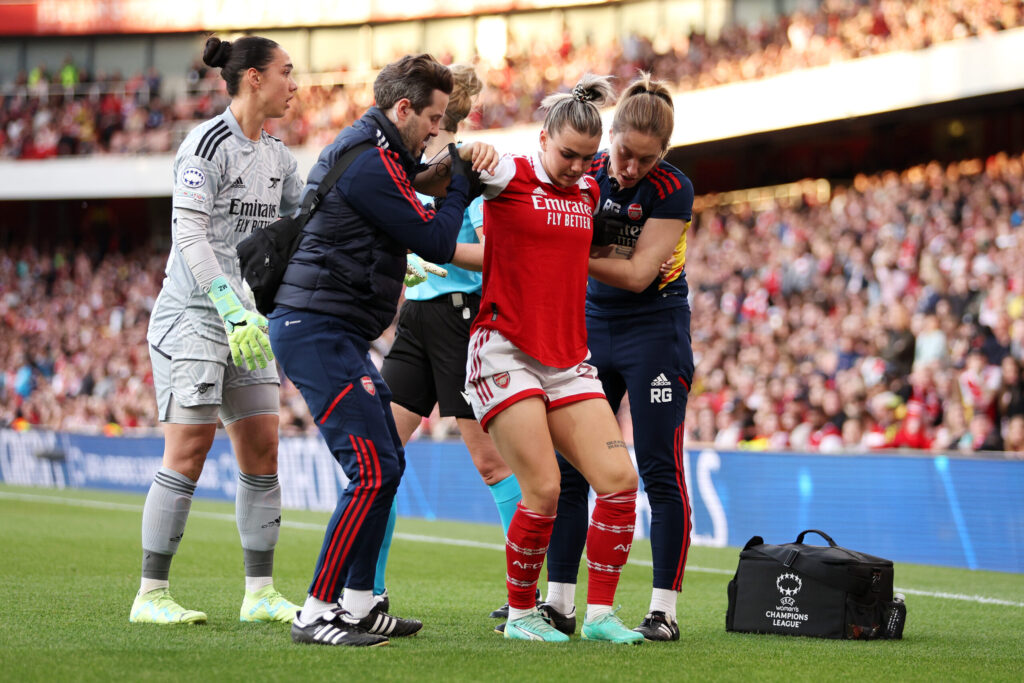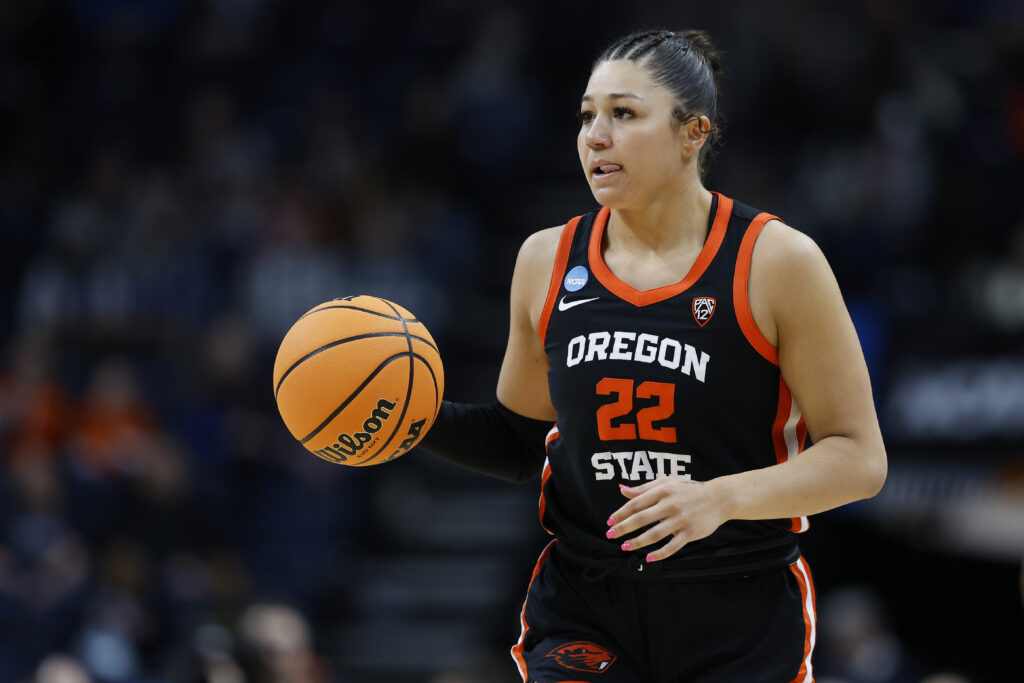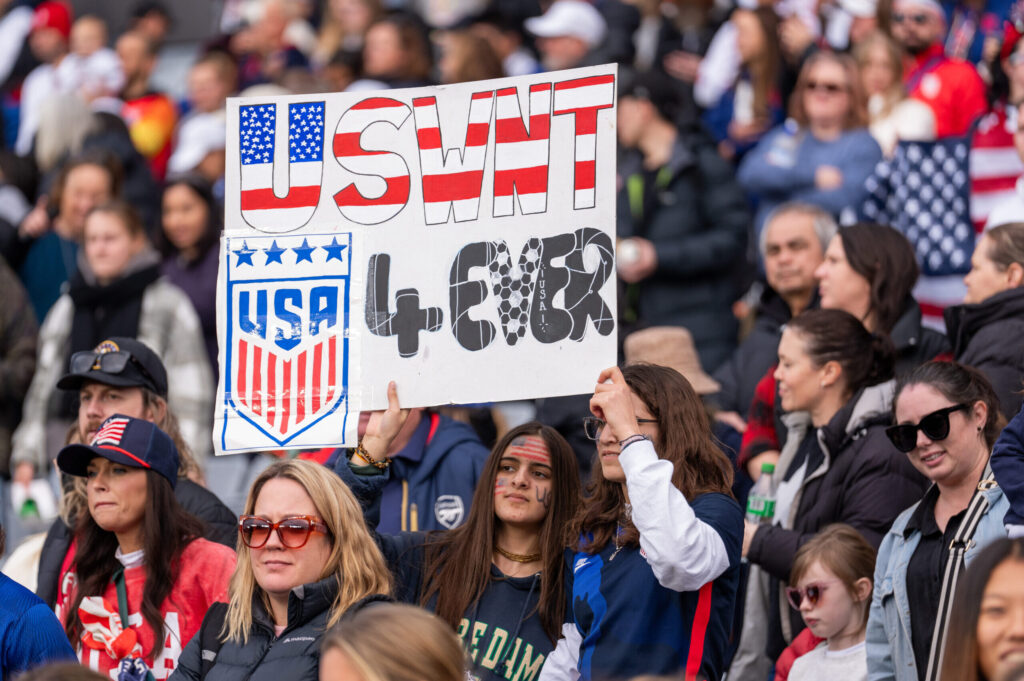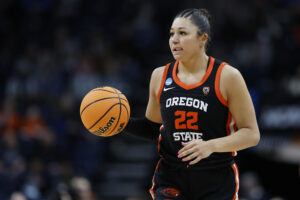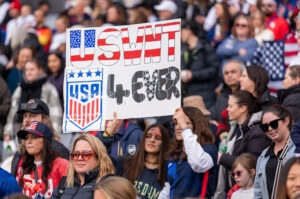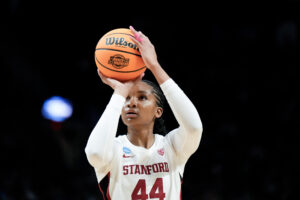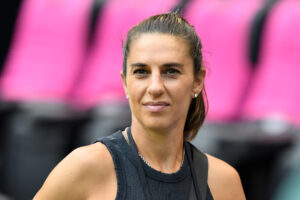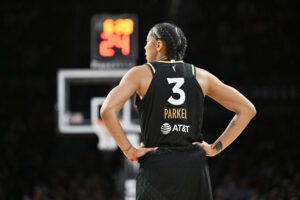Kelsey Bing is an All-American goalkeeper for the Stanford field hockey team and a member of the US National Team. A three-time America East Goalkeeper of the Year, Bing will be graduating from Stanford this spring. She spoke with Just Women’s Sports about how she became a goalkeeper, what drew her to Stanford, and what comes next amidst the uncertainty surrounding coronavirus and the US National Team, which failed to qualify for the Tokyo Olympics.
When did you start playing hockey and why did you choose to be a goalkeeper?
I started playing in the seventh grade at the middle school I went to. It had a trimester sport system and you had to play a sport for every season, and the options for fall were field hockey, volleyball and cross country. Cross country didn’t sound all too fun to me and I didn’t really want to be inside. My mom told me field hockey is a lot like soccer, so I tried it out.
I was actually a field player through most of middle school. We had 30 girls on our team, and obviously you’re not going to get a lot of playing time if you have that many kids on the team, but there was a deal with our coach where if you suited up as goalie for half the game, then you didn’t have to come out for the other half. A couple friends and I were like, “I think we might get more playing time if we do it that way.” So we became goalies. But I didn’t really start getting serious about it until when I joined a club team at the end of eighth grade. And then that was when I was like, “Oh, this is actually fun. It’s not just something I’m doing just to get playing time.”
A lot of sports have goalkeepers. What makes field hockey’s unique?
I think it was actually a pretty easy transition from soccer because especially at the basic levels, being a goalkeeper in field hockey is kicking the ball with the inside of your foot. And then the next progression from that is lunging. I was also into fencing for a little while when I was younger, so I was used to the whole equipment getup. Lunging in fencing is also very compatible with field hockey. A lot of the mechanics and the nitty gritty details of being a goalkeeper in field hockey are very different than fencing, but at the time when I first started I was like, “Oh, this was super similar to these things that I’ve done before.”
Goalkeeping in field hockey is still kind of its own world, though. I have to show people pictures of all the equipment I wear, because when I try to describe it, it quickly devolves into a mess. I mean, my mom likes to joke that I look like a transformer when I’m wearing my kit.

What do you think makes for a good field hockey goalkeeper?
I think just being able to be athletic in pads is a huge part of the role. One of the things that helped me the most initially is that I was just willing to give it a go. I didn’t really have any positive field hockey goalkeeping role models to look up to. It was just, “What can I find on YouTube? Okay, I know what’s going on.”
You have to love the game and not be afraid that you’re going to mess up, especially in high school. And then once you get to the higher levels, like in college, goalkeeping becomes incredibly technical. You learn all the nuances and little details of the game, and you start to develop a personal style. I’m pretty analytical. I’m an engineer at Stanford, I major in mechanical engineering. So I’m pretty used to diving back into what I’m doing and digesting every little individual piece moving forward. It’s something that I feel is built inside of me, which I’ve always done for better or for worse. But I think to succeed, you have to be a student of the game. You need to know what’s happening at every position on the field.
How did you end up at Stanford and why did you choose to play there?
Academics has always been incredibly important to me. I love playing field hockey, but I also know my education is very important. A lot of it just boiled down to Stanford being one of the best academic institutions in the entire world. I felt fortunate that I even had the ability to go there. The athletic complexes are also just crazy. And then finally, I wanted to go into engineering. So that limited some of the schools in which I could look at specifically, but I don’t think it was a bad thing. Every day I’m so grateful that I was even afforded the chance to go to Stanford.
You were the starting goalkeeper your freshman year. How did you handle that pressure and how were you so successful at the position?
Where I really got lucky was that a coach saw potential in me as a junior in high school and put me on the under 21 junior national team. It makes sense now, but at the time, I was like, “I’m just this goalie from Texas, what the heck?” But being on the under 21 team as a junior in high school, I had two years to play with some of the best freshmen, sophomores and juniors in college. So I had this ability to acclimate to the game a little bit earlier before most of my class, which was definitely nice.
Goalkeeping is pretty mental. You can psych yourself out in a million different ways. Like being a student at Stanford, there’s definitely duck syndrome, where you’re like, “Yeah, I’m just going to keep moving along. I don’t really know if I belong here, but I hope I do.” And so maybe I wasn’t the most comfortable freshman but I was afforded the chance to make mistakes and learn from them which was very generous of the coaches. I was able to build confidence because they trusted me.
You won the National-Scholar Athlete award for the 2019 season, which goes to the All-American who earns the highest GPA through the first semester of the year. Can you talk about what that meant to you?
I was pretty excited to win the award. It meant a lot to me because I think sometimes people get into their heads that, “If you’re an athlete, that’s the only thing you can do.” And so to see that somebody can be high achieving in both academics and athletics is important to me. It’s also nice because it’s somebody recognizing that yeah, I’m putting hard work in on the field but also in the classroom. Not that that needs to be noticed, but it always feels nice when somebody tells you like, “Hey, you’ve done a really good job here.” My parents think it’s the best thing in the world. They’re so excited about it. My mom’s like, “This is the best thing you’ve ever won.”
When did you start playing for team USA?
I spent four years on that under 21 team, from my junior year of high school through my sophomore year of college. And then that October, Janneke Schopman, who was the coach at the time, called me in and asked if I would be able to take some of my junior year off to train for the Olympic qualifiers. And so that’s how I got moved up which was pretty cool. I took off winter quarter to train and play in the pro league, which is where the US and eight other countries play home and away games in every country, which, for me, was the coolest thing ever. I was so excited to get to travel and just get to see the hockey cultures of every place we were going to.
You’re graduating from Stanford this spring. What’s next for you?
For the time being, I’m just training as if we’re in the off season. I’m just running outside the front of my house and doing all these weird body weight workouts because I have to go outside to workout. All my neighbors, they’re like, “Oh, what are you training for?” They don’t really get it. In an ideal world, I would be able to find something where I could do both field hockey and an engineering job. Because as I’ve said, I do care a lot about my professional development. I would love to keep training with the national team. I hope that’s still in the books, but it’s so uncertain now.
My dream professionally would be to do something with autonomous vehicles or autonomous aircraft. My depth in mechanical engineering is in dynamics and controls, so it has a lot to do with autonomous systems. Right now, there’s just so much up in the air with USA Field Hockey because we’re in the midst of a location transition and everything. I’m hoping that once I have a little bit more information to work with, I could find something that was feasible, but maybe it’s going to be applying to grad school. Because I know a lot of the girls on the team are able to manage school and play.
Not qualifying for the Tokyo Olympics was devastating. That was really just a low of my career in field hockey. I definitely feel like I have something there to prove like, “Hey, this isn’t the standard. The US field hockey team belongs in the Olympics.” I would love to be a part of that. And I think one of the things that draws me back to field hockey is that I feel I have so much more to learn and develop and grow and I can always come back to my professional career. In 30 years if I decide I want to become a field hockey player again, my body is not going to let me. My time to do it is now.
